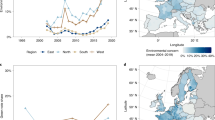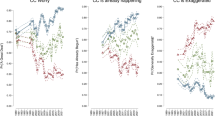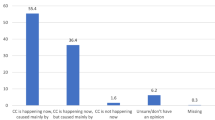Abstract
From a political perspective, advancing green agendas in democracies requires obtaining electoral support for parties and candidates proposing green platforms. It is therefore crucial to understand the factors driving green voting and attitudes. Yet, limited research has explored the role of economic determinants in this context. In this study we show that globalization, through the distributional consequences of import competition, is an important determinant of support for parties proposing green platforms. Our analysis covers the United States and 15 countries of Western Europe, over the period 2000–2019, with trade exposure measured at the level of subnational geographic areas. We find that higher trade exposure leads to lower support for more environmentalist parties and to more sceptical attitudes about climate change. Our empirical findings are in line with the theoretical channel of deprioritization of environmental concerns, as trade-induced economic distress raises the salience of economic issues.
This is a preview of subscription content, access via your institution
Access options
Access Nature and 54 other Nature Portfolio journals
Get Nature+, our best-value online-access subscription
$29.99 / 30 days
cancel any time
Subscribe to this journal
Receive 12 print issues and online access
$209.00 per year
only $17.42 per issue
Buy this article
- Purchase on Springer Link
- Instant access to full article PDF
Prices may be subject to local taxes which are calculated during checkout


Similar content being viewed by others
Data availability
The data analysed in this study are available in the Harvard Dataverse repository at the following link: https://doi.org/10.7910/DVN/T4ZAHS ref. 25. All data are publicly available with one exception: individual data from the Gallup Poll Social Series. The Gallup-based replication database is shared upon request with researchers who have access to Gallup data.
Code availability
The data analysis was carried out in Stata and R. The codes that generate and visualize the results reported in this study are available in the Harvard Dataverse repository at the following link: https://doi.org/10.7910/DVN/T4ZAHS ref. 25.
References
Drews, S. & Van den Bergh, J. C. What explains public support for climate policies? A review of empirical and experimental studies. Clim. Policy 16, 855–876 (2016).
Hazlett, C. & Mildenberger, M. Wildfire exposure increases pro-environment voting within Democratic but not Republican areas. Am. Polit. Sci. Rev. 114, 1359–1365 (2020).
Hoffmann, R., Muttarak, R., Peisker, J. & Stanig, P. Climate change experiences raise environmental concerns and promote green voting. Nat. Clim. Change 12, 148–155 (2022).
Kahn, M. E. & Kotchen, M. J. Business cycle effects on concern about climate change: the chilling effect of recession. Clim. Change Econ. 2, 257–273 (2011).
Autor, D. H., Dorn, D. & Hanson, G. H. The China syndrome: local labor market effects of import competition in the united states. Am. Econ. Rev. 103, 2121–2168 (2013).
Inglehart, R. The silent revolution in Europe: intergenerational change in post-industrial societies. Am. Polit. Sci. Rev. 65, 991–1017 (1971).
Weber, E. U. Experience-based and description-based perceptions of long-term risk: why global warming does not scare us (yet). Clim. Change 77, 103–120 (2006).
Kahn, M. E. & Matsusaka, J. G. Demand for environmental goods: evidence from voting patterns on California initiatives. J. Law Econ. 40, 137–174 (1997).
Berthe, A. & Elie, L. Mechanisms explaining the impact of economic inequality on environmental deterioration. Ecol. Econ. 116, 191–200 (2015).
Vona, F. Job losses and political acceptability of climate policies: why the ‘job-killing’ argument is so persistent and how to overturn it. Clim. Policy 19, 524–532 (2019).
Colantone, I. & Stanig, P. The trade origins of economic nationalism: import competition and voting behavior in Western europe. Am. J. Polit. Sci. 62, 936–953 (2018).
Autor, D., Dorn, D., Hanson, G. & Majlesi, K. et al. Importing political polarization? The electoral consequences of rising trade exposure. Am. Econ. Rev. 110, 3139–3183 (2020).
Ballard-Rosa, C., Malik, M. A., Rickard, S. J. & Scheve, K. The economic origins of authoritarian values: evidence from local trade shocks in the United Kingdom. Comp. Polit. Stud. 54, 2321–2353 (2021).
Gemenis, K., Katsanidou, A. & Vasilopoulou, S. The politics of anti-environmentalism: positional issue framing by the European radical right. In MPSA Annual Conference, 12–15 (2012, Chicago, USA).
Colantone, I., Di Lonardo, L., Margalit, Y. & Percoco, M. The political consequences of green policies: evidence from Italy. Am. Polit. Sci. Rev. 1–19 (2022); https://doi.org/10.1017/S0003055423000308
McCright, A. M. & Dunlap, R. E. The politicization of climate change and polarization in the American public’s views of global warming, 2001–2010. Sociol. Q. 52, 155–194 (2011).
Imai, K., Keele, L., Tingley, D. & Yamamoto, T. Unpacking the black box of causality: learning about causal mechanisms from experimental and observational studies. Am. Polit. Sci. Rev. 105, 765–789 (2011).
Anelli, M., Colantone, I. & Stanig, P. Individual vulnerability to industrial robot adoption increases support for the radical right. Proc. Natl Acad. Sci. USA 118, e2111611118 (2021).
Hummels, D., Jørgensen, R., Munch, J. & Xiang, C. The wage effects of offshoring: evidence from Danish matched worker–firm data. Am. Econ. Rev. 104, 1597–1629 (2014).
Bernard, A. B., Jensen, J. B. & Schott, P. K. Survival of the best fit: exposure to low-wage countries and the (uneven) growth of US manufacturing plants. J. Int. Econ. 68, 219–237 (2006).
Autor, D. H., Dorn, D. & Hanson, G. H. The China shock: learning from labor-market adjustment to large changes in trade. Annu. Rev. Econ. 8, 205–240 (2016).
Kollman, K., Hicken, A., Caramani, D., Backer, D. & Lublin, D. Constituency-level elections archive [data file and codebook] (Center for Political Studies, Univ. Michigan, 2016).
Bafumi, J. & Herron, M. C. Leapfrog representation and extremism: a study of American voters and their members in congress. Am. Polit. Sci. Rev. 104, 519–542 (2010).
Volkens, A. et al. The Manifesto Data Collection. Manifesto Project (MRG/CMP/MARPOR), version 2018a (WZB, 2018); https://doi.org/10.25522/manifesto.mpds.2018a
Bez, C., Bosetti, V., Colantone, I. & Zanardi, M. Replication data for: exposure to international trade lowers green voting and worsens environmental attitudes (2023); https://doi.org/10.7910/DVN/T4ZAHS
Acknowledgements
We are grateful to M. C. Attolini, Y. Filippone, P.-L. Mengel, G. Palladino, A. Pisa and Y. Stuka for excellent research assistance. We thank H.-G. Betz, J. Frieden, P. Hall, P. Stanig, D. Tingley, F. Vona, and seminar participants at Paris School of Economics, Scuola Superiore Sant’Anna, University of Liverpool and at the ETSG Conference 2021 in Ghent, for helpful comments and suggestions.
Author information
Authors and Affiliations
Contributions
The initial research idea stems from I.C. and M.Z. C.B. was mainly responsible for preparing the election data for Europe, and the attitudes data for the United States and for Europe. M.Z. prepared the election data for the United States. I.C. and M.Z. prepared the trade exposure indicators. C.B., I.C. and M.Z. wrote the code and carried out the regression analysis. C.B. produced the figures. C.B., I.C. and M.Z. produced the tables. V.B. gave conceptual guidance and supported the theoretical framing and interpretation of the findings. I.C. wrote the original draft, and C.B., V.B. and M.Z. reviewed and edited the manuscript.
Corresponding authors
Ethics declarations
Competing interests
The authors declare no competing interests.
Peer review
Peer review information
Nature Climate Change thanks the anonymous reviewers for their contribution to the peer review of this work.
Additional information
Publisher’s note Springer Nature remains neutral with regard to jurisdictional claims in published maps and institutional affiliations.
Supplementary information
Supplementary Information
Supplementary Tables 1–42 and Fig. 1.
Rights and permissions
Springer Nature or its licensor (e.g. a society or other partner) holds exclusive rights to this article under a publishing agreement with the author(s) or other rightsholder(s); author self-archiving of the accepted manuscript version of this article is solely governed by the terms of such publishing agreement and applicable law.
About this article
Cite this article
Bez, C., Bosetti, V., Colantone, I. et al. Exposure to international trade lowers green voting and worsens environmental attitudes. Nat. Clim. Chang. 13, 1131–1135 (2023). https://doi.org/10.1038/s41558-023-01789-z
Received:
Accepted:
Published:
Issue Date:
DOI: https://doi.org/10.1038/s41558-023-01789-z
This article is cited by
-
Examining the effects of gasoline prices on public support for climate policies
Nature Energy (2024)



